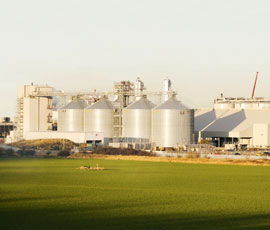Ensus bought by German bioethanol maker

Troubled UK bioethanol producer Ensus has been bought by CropEnergies of Mannheim, Germany.
The move could restore a valuable market for UK feed wheat this autumn, once a planned £50m has been spent by the plant’s new owner to improve the operation.
The acquisition doubles CropEnergies’ bioethanol production capacity – Teesside-based Ensus will operate alongside its new owner’s plants in Germany, Belgium and France.
Former owner The Carlyle Group will become a shareholder in CropEnergies as a result of the purchase of Ensus.
Ensus is one of Europe’s largest bioethanol plants with capacity to produce 400,000m3 of bioethanol and 350,000 tonnes of dried protein animal feed (DDGS) from 1.1m tonnes of feed wheat. Carbon dioxide is a further by product and is processed for use in food and drink products.
CropEnergies background
- One of the largest bioethanol producers in Europe
- Member of Südzucker group – largest sugar producer in Europe
- Founded in Mannheim, Germany, in 2006
- Production facilities in Germany, Belgium, the UK, and France
- Also has trading offices in the USA and Brazil
The plant was commissioned more than three years ago and employs about 100 people. It has been plagued by technical and market challenges, resulting in its indefinite closure in April. It began production in early 2010 and last season had to import maize because of the poor quality of the UK harvest.
NFU combinable crops adviser James Mills described the purchase as very good news for the UK agricultural industry.
“Following the opening of Vivergo earlier in the month, the possibility of a second ethanol plant online in the North East could be a great boost to UK wheat and animal feed production,” he said.
“The focus must now be on the European decision on indirect land use change (ILUC) and the market certainty to 2020 and beyond that policy makers have the opportunity to provide consistent, science-based policies.”
Ensus imports maize due to poor wheat quality
